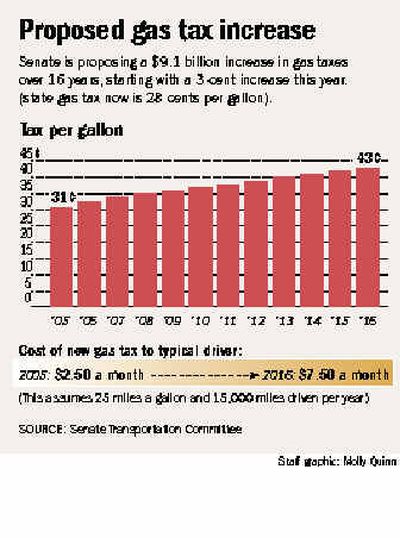Higher tax at pump would pay for roads

OLYMPIA – The state Senate this week will consider a series of gas tax hikes that would raise $9.1 billion over the next 16 years, starting with a 3-cent increase in July.
About 75 percent of the money would be spent in central Puget Sound, according to the plan’s top architect, Sen. Mary Margaret Haugen, D-Camano Island.
“That’s just a matter of practicality. That’s where the needs were,” said another supporter, Sen. Dan Swecker, R-Rochester.
The proposal calls for boosting the state’s 28-cent gas tax by 3 cents this year, 2 cents next year, and a penny a year for the decade after that.
“It’s a user fee. It’s necessary,” said Swecker. “We can’t get by without it.”
Half of the money would be spent on three Seattle-area transportation headaches: the aging double-decker Alaskan Way Viaduct, the State Route 520 floating bridge, and Interstate 405. In addition, central Puget Sound residents would have to pony up billions of dollars more in local taxes to pay for the costly “mega-projects.”
The full Senate is expected to vote on the plan Wednesday. The House of Representatives and the governor would also have to approve it. Both House Speaker Frank Chopp and Gov. Christine Gregoire on Monday said any such plan needs strong bipartisan support. So far, most of the lawmakers vocally backing the Senate plan are Puget Sound Democrats.
“Unless Democrats and Republicans from both Eastern and Western Washington can agree on a long-term funding plan, there’s no sense in pursuing it,” Gregoire said.
The project list released Monday also includes more than $200 million more for projects in the Spokane area, including $100 million toward the $2.18 billion North Spokane Corridor, a long-planned link between U.S. 395 and Interstate 90. Also on the list: $70 million would be spent to widen I-90 between Sullivan and Harvard roads, $34 million in work on a Spokane River bridge at SR 290, $32 million in work on the I-90 Spokane Viaduct and $1.5 million for a “Geiger Spur” rail link near Fairchild Air Force Base.
“There’s quite a bit over there,” said Haugen.
Not enough, some local lawmakers say.
“It’s great for King County, but not that great for everyone else,” said Sen. Brad Benson, R-Spokane.
“I don’t think we even get back 50 percent of what we generate in this (proposal),” he said. “There are some good things in there, but you have to protect your taxpayers. … I’m not getting any e-mails from anyone saying ‘Please tax me more.’ “
The Senate plan would cost an average driver $2.50 more per month this year. By 2016, when the full 15-cent increase takes effect, a driver would be paying $7.50 more per month.
Ballot measure promoter Tim Eyman called the proposed tax increase “sadistic,” saying it will hurt working families and senior citizens. Sen. Don Benton, R-Vancouver, called it “outrageous.” Instead of higher taxes, he said, the state should pass efficiency reforms to make state road projects cheaper.
Haugen said that further delays in the work will jeopardize drivers’ safety. Central Puget Sound is part of a “high seismic-risk zone.”
“This package is about making sure that our bridges do not fall down and our state come to a halt in the event of an earthquake,” said Haugen.
If that happens, she warned, “We’ll go from five hours a day stuck in traffic to 12 hours a day stuck in traffic.” Gridlock on quake-ruined highways would cripple the Seattle-area economy, the state’s economic engine.
The bill also steers $32 million more per year to cities and counties to help them fix potholes and repair local roads, said Sen. Joyce Mulliken, R-Ephrata.
At a news conference in Olympia Monday, labor, construction and local government officials called the plan badly needed and politically courageous.
“It’s progressive, it’s bold, it’s long needed,” said Bob Drewell, executive director of the Puget Sound Regional Council.
Unlike a sales tax, Washington’s gas tax doesn’t rise proportionally with the price of gas. Inflation is slowly eroding the state’s ability to keep up with transportation projects, lawmakers say.
“The reason we’re here today is because the Legislature did nothing for so many years,” said Haugen.